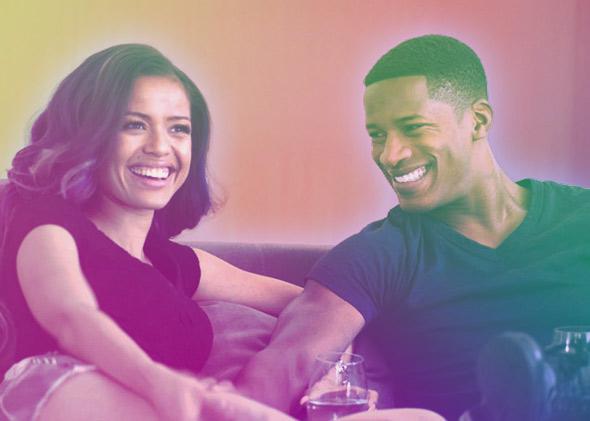Dear All,
That first round of conversation was so full of promising volleys it has me feeling like Alessandro Nivola’s wealthy heating-oil scion in A Most Violent Year, chasing the tennis balls being machine-launched at him on his private indoor court. (The rich sight-gag opportunities offered by that setup were sadly foregone by the director, J.C. Chandor, whose first two films, Margin Call and All Is Lost, had a dry wit that’s mostly absent from his third, an ambitious but disappointingly decorative attempt at a period crime drama.)
For now, I’ll just seize on one movie Stephanie praised that’s been shafted by a cruelly shortsighted marketing and release strategy: Gina Prince-Bythewood’s Beyond the Lights, a sweet, tart surprise that arrived late in the year and that, six weeks after was released to largely rapturous reviews and a Cinemascore of A, is now virtually impossible to see, playing on only a handful of screens nationwide. Even more inexplicably, the film’s distributor, Relativity Media, has yet to make the film available on demand, even after it began to show up on lists of the year’s best overlooked movies—a bizarrely self-sabotaging choice, given this inexpensive indie’s potential to do a booming business in the home-viewing market. This is the kind of picture I wish more studios and distributors would realize could appeal to audiences of different races, ages, genders, and whatever other demographic categories we’re forever being algorithmically sorted into. Though it takes place predominantly in a black and mixed-race world, this backstage romance—an old-style showbiz melodrama, really, set in the coldly capitalist world of 21st-century celebrity—is much more than just a date movie for black audiences (a bizarre marketing concept in itself, but we’ll leave that there for now). One of my favorite things about Beyond the Lights was how casually Prince-Bythewood manages to weave sharp observations about gender or race (say, misogyny in hip-hop culture or the difficulties of raising a black child as a white single mother on the dole) into the big juicy soap-opera plot.
And speaking of weaving, was there a sweeter and realer moment between two lovers on-screen this year than when Noni, a rising hip-hop star who for much of the film wears a long lavender-streaked weave as part of her impeccably maintained hot-girl look, appears for the first time before her police officer-turned-boyfriend Kaz in her short-haired, ringleted glory? You don’t have to have ever worn a weave (Stephanie, did you get the Tilda yak-hair one? Send pix!) to find that moment both touching and sexy. Kaz and Noni, as played by the moltenly hot they’d-better-become-movie-stars Gugu Mbatha-Raw and Nate Parker, were the on-screen match of the year—even if the most finely drawn relationship in that movie may have been the one between Mbatha-Raw’s troubled starlet and her hard-driving “momager,” a complicated villain played with tremendous empathy and restraint by Minnie Driver.
It’s a tricky thing, this issue of “representation”—of one’s gender, race, sexual orientation, etc.—in front of and behind the cameras. On the one hand, one wants—or I do, at times anyway—to be an advocate, shouting “you go, girl” from the sidelines as the Australian actress-turned-director Jennifer Kent makes a spectacular debut with The Babadook (one of the best horror films I’ve seen in the last 10 years, and one that has plenty to say even to non-fans of the genre) or Ava DuVernay shows every possibility of becoming the first black woman ever to be nominated for a directing Oscar for Selma. On the other hand, no one wants to feel like a beneficiary of attitudinal affirmative action, and none of these women—Prince-Bythewood, DuVernay, Kent, A Girl Walks Home Alone at Night’s Ana Lily Amanpour—either require or request it. I know whenever anyone singles me out for praise as a “female film critic,” a part of me bristles at the condescension and resents the essentialization. I believe in what Stephanie says about going to the movies for “the gloriously wide spectrum of human experience.”
And David: Julianne Moore’s otherworldly performance in Still Alice—which is so humble and transparent and true all the coming wisecracks about Alzheimer’s as Oscar bait ought to slide straight through it like human hands through a ghost—may have been directed by two men, but what’s more interesting to me is that those two men are a long-married couple, one of whom made the movie while suffering from a recently diagnosed ALS-like disease that took away his ability to speak during the course of filming. There are other ways into each other’s profound human experience beyond those provided by our longstanding tribal affiliations. And yet it seems important to guard a place in the conversation, and on the marketplace, for the voices of those who historically have had so fewer chances to speak.
Amy, could you solve this eternal aesthetic and moral conundrum for us real quick as we kick off the second round? And once that’s sorted out, I would love to hear you talk a little about Boyhood, which all of us except for you have somewhere on our 2014 best-of lists. What was it like being a non-Boyhood partisan in a year when that movie enjoyed such near-universal acclaim from both critics and audiences? There’s something about the life-spanning scope of Boyhood’s project, as many have noted, that makes it curiously resistant to critical analysis. Watching time unfold literally at the cellular level, in the ever-growing and changing body of Ellar Coltrane’s Mason, at times feels like witnessing a long-form magic trick. But to the skeptical, is it more of a long con? Do the praises of those who dug this movie with few reservations make us sound like pinwheel-eyed dupes to those who were immune to its spell? As Mason, tripping on mushrooms, marvels in the (to me) sublime last line of Boyhood, “It’s always now.” Which means, in my case, way past time to file this dispatch and hand Amy the baton.
Trippingly,
Dana
